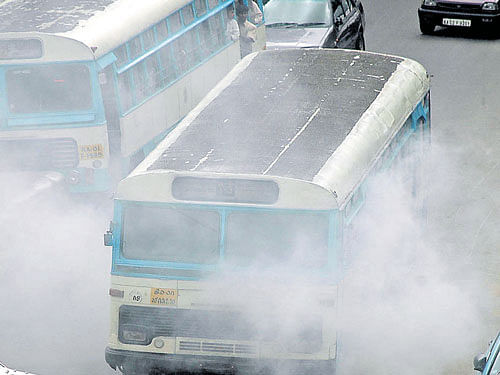
Intensive emission testing drives will be carried out across the City from this month-end in an effort to keep tabs on rising pollution levels.
Random checks will be conducted by the Karnataka State Pollution Control Board (KSPCB) along with the Transport department and the Traffic Police department.
Speaking to Deccan Herald, KSPCB chairman Lakshman said that in the wake of rising pollution levels, the board had decided to carry out a series of emission testing drives. All types of vehicles, including buses and trucks, will be subjected to checks. Apart from vehicles, emission testing centres will be under scrutiny because there are many cases where faulty certificates have been issued to polluting vehicles, he said.
“Around 42 per cent of air pollution in Bengaluru is caused by the transport sector and a checking mechanism has to be introduced to curtail this. A fine amount will be finalised for penalisers and more emission testing centres will be set up. Also, mobile emission testing vehicles will soon start plying at prime locations in the City,” he said.
Those with emission certificates will also be checked and in case their vehicle is found violating norms, action will be taken.
Pollution stats
According to KSPCB, some of the most polluted areas in the City include Central Silk Board junction, Whitefield, Yelahanka and Magadi Road, where traffic congestion is high and construction is booming. It was found that respirable suspended particulate matter (RSPM) was the highest at Central Silk Board with 188 ug/M3, against the standard of 60 ug/M3, between October and December 2015. This is an increase in pollution levels by 213 per cent.
The second highest polluted area, after Central Silk Board, was found to be the Export Promotional park of ITPL, Whitefield, Graphite India Limited premises. Here, the RSPM level is 182 ug/M3, an increase by 203 per cent. The only place where RSPM levels were under limit was at SG Halli with 46 ug/M3.
At present, the Transport department is equipped with as many as 600 emission testing kits and 12 mobile testing vehicles. More mobile testing vehicles are likely to be added to the fleet.
DH News Service